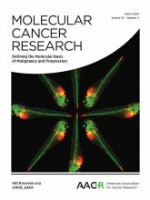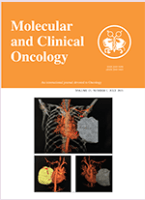
Cancer Biomarkers
Scope & Guideline
Exploring Novel Frontiers in Cancer Research.
Introduction
Aims and Scopes
- Biomarker Discovery and Validation:
The journal extensively publishes research aimed at discovering novel biomarkers that can be used for early detection, diagnosis, and prognosis of different cancer types. - Molecular Mechanisms of Cancer:
Research articles often focus on elucidating the molecular pathways and mechanisms through which identified biomarkers influence cancer progression and response to therapies. - Genomic and Epigenomic Studies:
A significant focus is placed on genomic and epigenomic alterations in cancer, including DNA methylation patterns and gene expression profiles that correlate with clinical outcomes. - Machine Learning and Bioinformatics:
The journal supports the application of machine learning and bioinformatics tools to analyze complex datasets and identify biomarkers with clinical relevance. - Immune Biomarkers and Microenvironment:
Research exploring the role of immune-related biomarkers and the tumor microenvironment in cancer progression and treatment response is a key area of focus.
Trending and Emerging
- Long Non-Coding RNAs (lncRNAs):
Research on lncRNAs is rapidly increasing, highlighting their potential roles as biomarkers for various cancers, particularly in regulating gene expression and cancer progression. - Immune Checkpoint Inhibitors:
The exploration of biomarkers related to immune checkpoint inhibitors is trending, reflecting the rise of immunotherapy as a cornerstone in cancer treatment. - Multi-Omics Approaches:
There is a growing trend towards multi-omics studies, integrating genomic, transcriptomic, proteomic, and metabolomic data to provide comprehensive insights into cancer biology and biomarker discovery. - Artificial Intelligence in Biomarker Discovery:
The use of AI and machine learning algorithms to analyze complex datasets and improve biomarker identification and validation is an emerging theme, indicating a shift towards data-driven research methodologies. - Tumor Microenvironment Studies:
Research focusing on the tumor microenvironment and its impact on cancer progression and therapy response is gaining prominence, emphasizing the interplay between cancer cells and their surrounding environment.
Declining or Waning
- Traditional Tumor Markers:
Research focusing on conventional tumor markers such as CEA or CA 19-9 appears to be declining as novel biomarkers and more sophisticated molecular techniques gain prominence. - Single Biomarker Studies:
There has been a shift away from studies focusing solely on single biomarkers, as the field moves towards multi-biomarker panels and integrative approaches that consider the complexity of cancer biology. - Invasive Diagnostic Techniques:
Research on invasive diagnostic methods is waning in favor of non-invasive liquid biopsy techniques that utilize circulating biomarkers for cancer detection and monitoring. - Chemotherapy Response Predictors:
The exploration of predictive biomarkers specifically for chemotherapy response has decreased, likely due to a broader focus on immunotherapy and targeted therapies. - Non-specific Biomarkers:
Interest in non-specific biomarkers that lack clear associations with particular cancer types or outcomes has diminished as the field emphasizes more precise and context-specific biomarker identification.
Similar Journals

Cancer Immunology Research
Unraveling the Immune Response in CancerCancer Immunology Research is a leading journal dedicated to the rapidly evolving field of cancer immunology, published by the American Association for Cancer Research. Established in 2013, this prestigious journal has quickly made a significant impact in its domain, achieving a 2023 Q1 ranking in both Cancer Research and Immunology. With an impressive Scopus rank of 24 out of 230 in cancer research and 28 out of 236 in immunology, it occupies a valuable position for researchers, professionals, and students engaged in cutting-edge cancer studies. Although it does not offer open access, the journal is committed to disseminating high-quality, peer-reviewed research that advances our understanding of the immune system’s role in cancer. The journal's objectives include fostering innovative studies, enhancing collaboration across disciplines, and promoting the translation of research findings into clinical applications, making it a vital resource for anyone invested in cancer therapy and immunological research.

Molecular Cancer
Advancing cancer research for a healthier tomorrow.Molecular Cancer, published by BMC, stands as a premier open access journal dedicated to advancing our understanding of cancer biology, treatment, and prevention since its inception in 2002. With an impressive Q1 ranking in the domains of Cancer Research, Molecular Medicine, and Oncology, this journal occupies a significant position in the academic landscape, emphasizing high-quality research that influences clinical practices and future studies. The journal is indexed in leading databases with exceptional Scopus ranks, reflecting its rigorous peer-review process and impactful contributions to the field, where it ranks in the top 2-3 positions across various relevant categories. Based in the United Kingdom, Molecular Cancer offers researchers worldwide a valuable platform for disseminating innovative findings that drive the biomedical community forward. The journal's open access model ensures that groundbreaking research is freely accessible, fostering collaboration and knowledge sharing among professionals, students, and academics alike. Explore cutting-edge developments in cancer research through Molecular Cancer and join a community committed to improving patient outcomes and advancing scientific discovery.

Journal of Cancer Metastasis and Treatment
Unraveling the complexities of cancer treatment.Journal of Cancer Metastasis and Treatment, published by OAE PUBLISHING INC, stands as a vital resource in the field of oncology, focusing on advancements and research pertaining to cancer metastasis and treatment methodologies. With an ISSN of 2394-4722 and an E-ISSN of 2454-2857, this journal aims to serve as a comprehensive platform for sharing innovative research, critical analyses, and novel findings from 2019 through 2024. As indexed in Scopus, it holds a notable Q3 ranking within its category, positioned at 240/404 and within the 40th percentile, thus reflecting its growing significance in the scientific community. Though currently not open access, the journal aspires to improve accessibility to pivotal oncology research, making it an essential tool for researchers, clinicians, and students keen on unraveling the complexities of cancer treatment and metastasis. Its commitment to promoting high-quality studies plays a crucial role in the ongoing quest to enhance patient care and outcomes in cancer treatment.

Cancer Communications
Unlocking Insights in Oncology for AllCancer Communications, published by WILEY, is a leading open-access journal that has positioned itself at the forefront of cancer research and oncology since its inception in 2017. With an impressive HIndex reflective of its scholarly impact and recognized in the Q1 category for both Cancer Research and Oncology as of 2023, this journal consistently ranks in the top echelons of its field, specifically at Rank #16/404 and Rank #13/230 in their respective categories on Scopus. Cancer Communications aims to disseminate cutting-edge research findings, innovative methodologies, and significant advancements in cancer treatments, thereby fostering a deeper understanding of oncology among researchers, healthcare professionals, and students. The journal operates under an Open Access model since 2018, ensuring that vital research is accessible to a global audience, thus enhancing collaboration and knowledge sharing necessary to tackle one of the most pressing health challenges of our time. Located in Hoboken, NJ, United States, and with a strong commitment to scientific excellence, Cancer Communications remains an essential resource for anyone engaged in the fight against cancer.

MOLECULAR CANCER RESEARCH
Transforming Research into Revolutionary TreatmentsMOLECULAR CANCER RESEARCH, published by the American Association for Cancer Research, stands as a pivotal journal in the fields of cancer research, molecular biology, and oncology. With an impressive impact factor and recognized as a Q1 journal in its respective categories for 2023, it serves as an essential resource for researchers, professionals, and students aimed at advancing our understanding of cancer mechanisms and therapies. The journal, identified by the ISSN 1541-7786 and E-ISSN 1557-3125, provides a platform for cutting-edge research and clinical applications, emphasizing innovation and collaboration within the scientific community. With its focus on high-quality, peer-reviewed articles, MOLECULAR CANCER RESEARCH is vital for anyone looking to stay abreast of significant advancements in cancer biology and treatment strategies. For more details and to access the journal's content, please visit the publisher's link.

BIOCHIMICA ET BIOPHYSICA ACTA-REVIEWS ON CANCER
Synthesis of Cutting-Edge Cancer DiscoveriesBIOCHIMICA ET BIOPHYSICA ACTA-REVIEWS ON CANCER, published by Elsevier, has established itself as a leading journal in the domains of cancer research, genetics, and oncology, holding a prestigious position in the Q1 quartile rankings in these fields as of 2023. With an ISSN of 0304-419X and an E-ISSN of 1879-2561, this journal aims to disseminate high-quality, impactful reviews that synthesize the latest advancements and findings in cancer biology, treatment modalities, and genomic studies. Its robust indexing and remarkable Scopus rankings—placing it in the 95th to 91st percentiles across various categories—underline its significance for researchers, clinicians, and students passionate about oncology. Operating from its Netherlands headquarters, BIOCHIMICA ET BIOPHYSICA ACTA-REVIEWS ON CANCER is dedicated to fostering a comprehensive understanding of the complex biological mechanisms underlying cancer, promoting innovative therapeutic strategies, and guiding future research directions.

Molecular and Clinical Oncology
Innovating cancer care through rigorous research.Molecular and Clinical Oncology is a dynamic journal published by SPANDIDOS PUBL LTD, aimed at advancing the understanding of cancer biology and treatment modalities. With an ISSN of 2049-9450 and an E-ISSN of 2049-9469, the journal serves as a critical platform for researchers and clinicians dedicated to uncovering novel insights in molecular oncology and enhancing clinical practices. As a testament to its growing influence, the journal has achieved a Q3 ranking in Oncology and a Q4 ranking in Cancer Research for the year 2023, reflecting its commitment to publishing high-quality research. Although currently not an Open Access publication, the journal offers crucial subscription options, ensuring comprehensive access to groundbreaking studies and innovations in the field. With converged years spanning 2018 to 2024, the journal is set to continue enriching the academic community with its valuable contributions, ultimately empowering researchers, professionals, and students engaged in the fight against cancer.

Analytical Cellular Pathology
Bridging Knowledge Gaps in Pathology and OncologyAnalytical Cellular Pathology, published by Hindawi Ltd, is a leading journal in the disciplines of Cancer Research, Cell Biology, and Pathology, and has been dedicated to advancing the field through open access since 1997. Based in Egypt, this journal plays a crucial role in disseminating cutting-edge research and innovative findings, fostering collaboration among researchers and professionals alike. With an impressive array of metrics, including its Q2 ranking in Pathology and Forensic Medicine and notable Scopus rankings, the journal attracts a diverse readership, ensuring significant impact in its categories. Designed to cater to the needs of both emerging and established scholars, Analytical Cellular Pathology promotes accessibility and exchange of knowledge, making it an indispensable resource for those engaged in modern cellular pathology research.

Cancer Cell International
Championing Excellence in Cancer ScienceCancer Cell International, published by BMC, is a transformative open-access journal established in 2001, dedicated to advancing the field of oncology and cancer research. With its ISSN number not specified and an E-ISSN of 1475-2867, the journal proudly operates from the United Kingdom, located at CAMPUS, 4 Crinan St, London N1 9XW, England. Renowned for its rigorous peer-review process, Cancer Cell International has made significant strides, securing a Q2 ranking in Cancer Research and Q1 rankings in both Genetics and Oncology as of 2023. It ranks impressively in Scopus, featuring in the top quintile of Genetics (#37/347) and Oncology (#52/404), indicating its importance within the scientific community. The journal's broad scope caters to a diverse array of topics within cancer biology, making it an invaluable resource for researchers, professionals, and students seeking to stay at the forefront of cancer science. With a commitment to disseminating high-quality research, Cancer Cell International invites scholars to explore innovative findings and contribute to the collective effort of combating cancer.

CANCER GENE THERAPY
Advancing the Frontier of Cancer TreatmentCancer Gene Therapy, published by SpringerNature, stands at the forefront of research in the fields of cancer research, molecular biology, and molecular medicine. With a robust impact factor reflecting its significant influence—ranking in the Q2 category for cancer research and Q1 for both molecular biology and molecular medicine—it serves as an essential resource for scholars and practitioners alike. Since its inception in 1994, the journal has dedicated itself to advancing the understanding and therapeutic application of genetic innovations in oncology. Notably, it holds distinguished Scopus ranks, placing it among the top tier journals in its categories, underscoring its importance to the scientific community. While open access options are not available, the compelling research published here offers invaluable insights into the latest advancements and strategies in cancer therapy. Engaging with *Cancer Gene Therapy* not only keeps professionals informed but also inspires future innovations in the quest for effective cancer treatments.